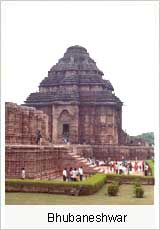| Introduction:
Bhubaneswar ('The Lord of the Universe'), the capital city
of the state of Orissa. This city traces its history to the
4th century B.C., when it was the capital of the huge nd prosperous
Kalinga Empire. In the 7th century, city became the capital
of the Sailodbhava kings, and that was when the Golden period
of the Bhubaneswar began. It is said that Bhubaneswar had
7,000 temples. Now only a few hundred ancient temples remain.
The Lingaraja temple is one of the most impressive temples
in India. Regrettably, non-Hindus are not permitted to enter,
but can view the temple only from the outside. There is no
real downtown area; rather, everything is spread out. The
railway station and the old bus stand are close to each other
in the center of town. The New long-distance bus station is
about 5 km west of the center of the town. Most of the temples
are located in the southeast section of the city, near the
Bindu-sarovara Tank. The skyline of Bhubaneswar is dominated
by the temples that are a true spectacle of the architectural
capabilities of the people of this historic city. Some of
the temples of Bhubaneswar have stood witness to the history
of this city that dates back to 25 centuries.
Sightseeing:
Lingaraj Temple:
This temple is dedicated to Shiva as Lord Lingaraj. Lingaraja
Temple represents the peak of achievement in Orissas middle
period. The 54m spire of the temple dominates the Bhubaneswar
landscape. Set in a walled compound, the Lingaraj is surrounded
by many smaller shrines.
The Parasuramesvera Temple:
A 7th century Shiva Temple, classical in style,one of the
oldest in Bhubaneswar. Located close to the main Bhubaneswar
to Puri Road, on the same side as the Lingaraj Temple, the
Grove of the Perfect Beings is a cluster of about 20 smaller
temples.
Rajarani Temple:
Rajarani is a 'love temple', covered with coyly erotic carvings
of women and couples. This 11th century Raja Rani temple is
aesthetically endearing, sculpted with graceful feminine figures.
It is surrounded by well-maintained gardens.
Khandagiri and Udayagiri Caves:
Twin hills honey-combed with Jain caves that reveal the sculptural
art of the 2nd century BC makes an interesting study of the
life and times of Jain ascetics.
Mukteswar, Siddheswar and Kedargauri Temples:
Not far from the Parsuarameswar is the small 10th century
Mukteswar Mandir, the Gem of Orissan architecture. The carvings
of dwarfs are particularly striking. In front of the temple
there is a beautiful arched architrave clearly showing a Buddhist
influence. | |
 |

